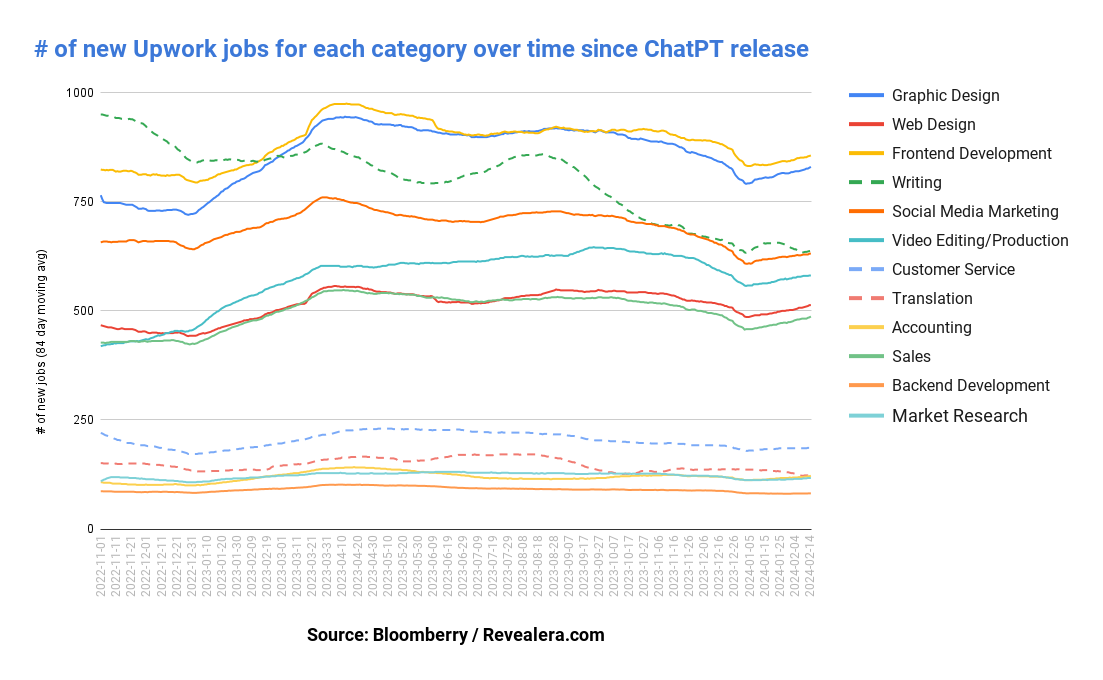

While interest in artificial intelligence (AI) among enthusiasts has been growing steadily since the 1950s, when Alan Turing first introduced the concept of measuring computer intelligence, it wasn’t until November 2022 that the lay public began to notice ( see trend).
Headlines about the launch of OpenAI’s ChatGPT began to dominate forums, social media and airwaves alike.
Seemingly out of nowhere, there was a user-friendly, conversation-based tool that the public could use — for free — that generated human-like text responses from a vast dataset of pre-existing information: the near totality of published human knowledge .
The advantages of such technology were immediately apparent. Users could get help 24/7 for a variety of tasks, including tutoring, code troubleshooting, recipe suggestions, writing help, and even fitness or health advice.
But the launch of such a tool was met with an equally healthy degree of skepticism. Was the world ready for something like this to come out yet? Could the widespread The adoption of artificial intelligence is clearly negative for humanity?
Important questions with important answers…but there was no time for discussion [on the broader public scene]. The tool—along with several competing technologies—fell to the fore.
The conversation immediately began to shift to how artificial intelligence could impact the collective workplace. This was only a year ago, and now, the impact is already being felt.
Jobs being replaced by AI
In a recent Artificial Intelligence in the Workplace study by Bloomberry, over 5 million freelance job postings were scrutinized to reveal the growing impact of AI on the freelance industry.
The studyaimed at identifying which jobs are being replaced by artificial intelligence, sheds light on the evolving landscape of freelance work and its future direction.
Perhaps unsurprisingly, Freelance Writing was among the hardest hit categories, with a 33% decline in job listings since the launch of ChatGPT.
Similarly, jobs related to Translation (-19%) and Customer Support (-16%) — seemingly simple tasks for a trained autonomous system — experienced significant shrinkage.

“Creative writing, data entry and key graphic design roles are among the most impacted by the incorporation of artificial intelligence. These areas have seen a significant shift towards automation, with AI tools increasingly capable of performing tasks traditionally completed by humans,” ChatGPT said when asked to elaborate on the study’s results.
And while the prospect among workers in the categories of freelancers most affected by AI are understandably poor, the broader freelance market has shown signs of adopting genetic AI.
The study highlights the increase in demand for online jobs is associated with AI oversight roles such as AI trainers and ethics compliance managers, indicating a shift toward more specialized positions that leverage human oversight of AI systems.
Additionally, “since ChatGPT launched, video editing/production jobs are up 39%, graphic design jobs are up 8%, and web design jobs are up 10%…which was amazing, given all the anecdotes of stories we’ve heard of people using ChatGPT to create full-featured code, illustrations, and even videos,” wrote Henley Wing Chiu, author of the study.
Industry experts agree, pointing to the transformative potential of artificial intelligence in freelancing. Dr. Helena Ford, a leading expert on artificial intelligence and labor markets, states, “It’s not just about job displacement. it’s about transforming work. The future belongs to those who can complement AI, not compete with it.”
Related: 12 Ways to Increase Your Income as a Freelance Writer
Should Freelancers Consider a Pivot?
As artificial intelligence continues to advance, the line between tasks that require human intuition and those that can be automated is becoming increasingly blurred.
Bloomberry’s study highlights the dual nature of AI in the freelance world. On the one hand, artificial intelligence is threatening traditional freelance jobs by automating tasks with unprecedented speed and efficiency.
On the other hand, it creates new opportunities earn money online for those who want to adapt and evolve. The findings suggest an imperative for freelancers to shift into roles that AI cannot easily duplicate, emphasizing creative, strategic and empathic skills.
Related: We asked over 1,000 everyday people about AI. Here’s what they said.

